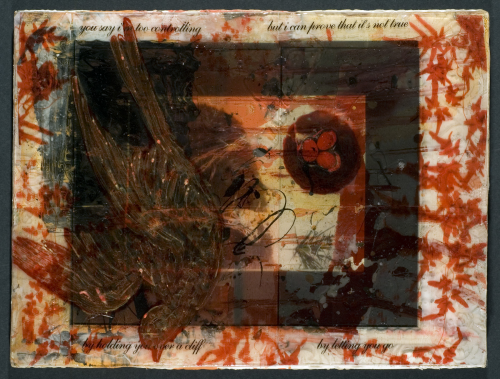Serendip is an independent site partnering with faculty at multiple colleges and universities around the world. Happy exploring!
Notes Towards Day 17 (T, Mar. 20): Gaming Us

should we go outside? what might we lose by doing so?

Kim Nortrop, "A Game of You," from
The Dream Suite, inspired by The Sandman
[genre comparison??]
I. coursekeeping
Thursday: warming up for The Immortal Life of Henrietta Lacks w/
The Way of All Flesh, dir. Adam Curtis. BBC, 1997 (58 minutes) --
take some time w/ the title (how does it direct your viewing experience?)
and w/ the genre of the BBC special: how is it "formed"?
how does it direct your experience? what different dimensions
make up the show? why is it shaped the way it is? what is its "point"?
what is not integrated/unclear to you....?
as prelude: learning and reflecting about how
we read/listen to/experience/accept stories:
Notes on Camp (58 minutes), The Civil Conversations Project (51 minutes),
& Memory and Forgetting (59 minutes)--per froggies315:
these stories beg questions about the point of telling non-fiction stories
-- so how to do this??
not unrelated: dglasser's lab has now evolved into a Guggenheim-like
spiral structure for applying the scientific method to literature:
an English Methods Exhibit in which you can 1) Ask/Find a Question
2.) Do background research 3.) Construct a Hypothesis/Question
4.) Experiment 5.) Analyze data/Draw Conclusion
(the collaboration floor!) 6.) Report results/reflection...
how does this differ from English 250?? and/or what we do here...?
II. last week, I suggested that A Game of You offered a
particularly striking intervention in the binary we've used to
construct the remainder of the semester, shifting from "non-fiction"
to "speculative fiction," from "realistic" stories to "science fiction"--
and also that it connected literary "genres" with the "genre" of the self
our Sunday night "e-discussion" about A Game of You,
kicked off by kobieta, focused entirely on these questions:
how do we determine identity …
Is it based on our own dreams ….or the general ideologies
and rules of society, coming from the web of
interactions between perceptions and ideas?
a discussion followed between kobieta and KT,
about which sphere we have more control over/can alter,
and kobieta responded,

then others joined in:
froggies315: Isn’t it exciting that the things that happen in our
head have the ability to manifest themselves in the physical world?
I know that my imaginings inform my choices and my identity and...
that’s cool! ....[but] for Wanda, the boundary between dreams and
reality is hard, fast, and ultimately insurmountable....She is trapped.
EGrumer: the moon cares about biology ... Perhaps the moon is
outdated, too old to understand? ...far more sad than scary.
leamirella: I can't help but wonder what the boundaries of fantasy are....
While many of the events in A Game of You cannot happen in "real" life...
it takes reference from a very "real" and "true" world....fiction is never
purely fiction because of this referential characteristic....I'm thinking of
these ideas in relation to a couple of philosophical theorists
(Putnam's "Brains in A Vat" and Plato's "Allegory of a Cave")...
Ayla: "some inherent things cannot be changed"....
I agree that the characters are very real....The things they do,
though, are just not real and do not happen in a real world....
I can't agree that The Game of You is non-fiction.
froggies315: "The brain does not make much of a distinction between
reading about an experience and encountering it in real life" (NYTimes)-->
reading produces a vivid simulation of reality,
including experience unavailable off the page:
entering fully into other people’s thoughts and feelings.
dglasser: Thank you so much for posting this article!....
If dreams help you act in “reality”, use them...
If reality helps you dream, use your dreams....Use yourself.
Your brain is ... the most powerful tool to ever come into existence.
Thought can change everything; your perception, your life, others’ lives.
Everything! Therefore, I don’t feel the distinction between dreams and
reality is important....You can think of yourself being in control of two
lives! Two whole worlds! You can do anything; mold your lives!!!
Do we want to discuss/identify these boundaries? Possibilities?
Why might we need to/find it useful to? (sterrab, vspaeth, alicia?)
Let's try an experiment [from a session of the Evolving Systems Group:
a few Rorschach tests of our pattern-seeking, dream-imagining inclinations....]
What does this have to do with the "category"/genre we use to describe
A Game of You? How does our "uptake" of the text differ, based on
the category to which it is ascribed? Which realm (the physical world
or the world of dream) carries the most authority here? What element
of your being (of which you might not have been conscious?) has
been brought to the fore in your encounter w/ this text? What have
you now formulated that was not yet formulated?
Richard Walsh, "The Narrative Imagination Across Media."
Modern Fictions Studies 52, 4 (2006): 855-868.
Narrative cannot be medium-independent: it is always dependent
on representation in some medium. dreaming is a "first draft of thought"
..."the dream can't revise"...is a sequential, recursive process...
can be understood as ... the proto-fiction
or the proto-reality?
"Shouldn't stories dictate the shape our comics take, and not the other way around?
...a new form of sequential art...that recaptures comics' pre-print ancestor..."
thinking about graphic narratives as contemporary
forms of medieval illuminated manuscripts??

Rodney Sharkey, "'Being' Decentered in Sandman: History, Dreams,
Gender, and the 'Prince of Metaphor and Allusion,' ImageTexT:
Interdisplinary Comics Studies 2008 (4, 1): 1-32.
"what an unimaginably broad access to knowledge of unconscious
mental life we are promised by the interpretation of dreams" (Freud).
Sandman succeeds in both constructing a realistic picture ...and in
providing ... a form of liberation from this discourse. It is able to produce
this contradictorily coherent paradox by alternating beween two planes,
or two worlds--that of the physical plane and that of the dreaming plane--
where finally neither plane is the site of an originary, central form of authority.
Morpheus is burdened with the responsibility of maintaining a universe very
similar to what Lacan calls "the symbolic order"....Although...it is Dream who
is the center and locus of humanity's transcendent expectations....Dream is
the locus of a metaphysical logic that he himself resists....
...in issue by issue of the Sandman series he is a different figure drawn and
pencilled and coloured by different artists....He is the site of infinite play...
the fluidity and unfixity of dreams themselves.
"....it has been argued since Aristotle that events in narrative are radically
correlative, enchaining, entailing. Their sequence...is not simply linear but
causative....But...our minds inveterately seek structure"....However, in
Sandman this organizational capacity turns on the fulcrum of an essential
metaphoric displacement....the condensations and displacements of the
dream-work confound the readers' ability to properly distinguish between
supposed 'dreams' and 'reality.'
....borders are not fixed...identities are not entirely separate...experiences are shared
..."fused into a single unity in the manifest dream".... a more democratic notion of
the social is articulated through dreams which erode rationalist conceit.
experimental texts..."are often so fragmentary that one's attention is almost
exclusively occupied with the search for connections....to make us aware of
our own capacity for providing links....the reading process is selective, and
the potential text is infinitely richer than any of its individual realizations....
we bring to the fore an element of our being of which we are not directly
conscious...reading literature gives us the chance to formulate the unformulated."
....we have come to recognize words as a means of stabilizing differences; as
a way of representing experience in a universe built...on play....Vocal expression
...attempts to delimit the signifying capacity of words through intentionality....
Morpheus exists in comics and dreams which are both places so far unsubordinated....


